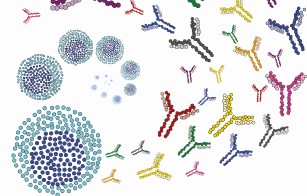Blizard research on the human antibody response reveals insights into long-term immune memory to vaccines and infections
In a paper published today in Science Immunology, researchers from the Blizard Institute conduct a detailed study of how antibody responses are generated in humans using a technique to measure the genes expressed by individual B cells and in parallel sequence their antibody genes. The findings could have implications for testing vaccine efficacy and understanding our immune systems more generally.

The study was conducted in collaboration with researchers at the Wellcome Sanger Institute in Cambridge and was funded by the Wellcome Trust. Using the tonsil as a model to understand normal immune process, the researchers looked at changes in gene expression in immune cells and mapped the evolution of the antibody response over time.
The new technique allowed researchers to map the evolution of the antibody response in relation to the changes in gene expression that occur during germinal cell responses. The germinal centre response is where long-lived immune memory is generated and so understanding how B cells evolve in this context is relevant to vaccine design.
Last author Dr Louisa James from the Blizard Institute said: “Germinal centres are one of the most fascinating features of our immune system, here B cells evolve to create a more functional antibody repertoire. But the rapid pace at which B cells shift from one state to another during the germinal centre response creates an overwhelming level of complexity. By combining single cell transcriptomics with antibody repertoire sequencing we were able to map the germinal centre response in fine detail.”
The researchers found evidence that B cells can change their antibody class early on during a response and that in turn this can influence how long they remain in the germinal centre.
First author Dr Hamish King from the Blizard Institute said: “There are lots of questions at the moment about the extent to which long term immunity is formed to SARS-Cov2, either in response to vaccination or past infection. But actually, we still don't understand some of the very basic mechanisms of how long-term immunity to any disease is formed.
“Our study has answered some of these questions by looking at the human immune system with the tonsil as a model to understand normal immune process. Our findings may be harnessed in combination with another recent technological advance - tonsil organoids (ie tissue in a dish) - to directly test efficiency of vaccines or treatments and understand our immune systems more generally.”
More information
- Research paper: 'Single-cell analysis of human B cell maturation predicts how antibody class switching shapes selection dynamics'. Hamish W. King, Nara Orban, John C. Riches, Andrew J. Clear, Gary Warnes, Sarah A. Teichmann, Louisa K. James. Science Immunology 12 Feb 2021: Vol. 6, Issue 56, eabe6291. DOI: 10.1126/sciimmunol.abe6291
- Find out more about the Centre for Immunobiology at the Blizard Institute
- Find out more about Barts and The London School of Medicine and Dentistry, Queen Mary University of London